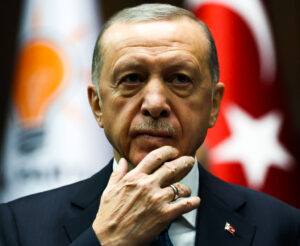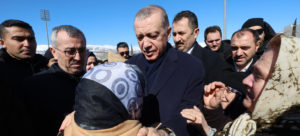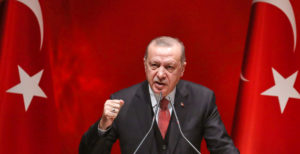A well-turned-out man with a pointy beard stands in the centre of a luxurious living room, looking fierce. He waves away two flunkies — one of whom is a fat man with a large moustache, wearing a pristine white shirt, through which you can see his vest. “Baba…” says a young man to the fierce-looking man, who holds up his hand to indicate silence, before (confusingly) also shouting: “Baba!” The camera pans to an older man on a sofa, who slips on what seems to be a dressing gown as suspenseful music plays. The women look on nervously. Then everyone starts bellowing.
Watching at home, transfixed to the television is my stepmother. One of Greece’s leading lawyers, she is not a woman who has much free time, or who indulges in frivolities. She is captivated.
It’s a Turkish soap — a dizi. If there is one country that has little time for Turkey and its exports, it’s Greece. But these shows, for all their absurdity and melodrama — or perhaps because of it — are a big draw. And Greece is not alone.
From the Mediterranean to the eastern bloc to Central Asia, Turkish soap operas are huge. In a 2011 survey, 78% of respondents across the Arab world reported having watched one. I have lost count of the number of times I’ve turned on a hotel TV, anywhere in the world, only to be assaulted by a barrage of emoting Turks with big hair.
Dizis (the Turkish hate calling them “soaps”) are unique: epic plotlines with seven minutes of adverts per 20 minutes of screentime, characterised by natural settings, a slow narrative pace, portentous music, and scripts dashed off week after week.
They are also big business. Between 2020 and 2022, global demand grew by 44%. Loved across Central and Eastern Europe, including Serbia, Croatia, Czech Republic, Romania, Poland and Hungary, they also have huge followings in Malaysia, Indonesia, Taiwan, Thailand, Singapore, Japan and Vietnam. Turkey is now the world’s second largest exporter of TV, after the United States, with more than 650 million viewers in more than 140 countries.
And if you want impact, how’s this: in 2008, the Grand Mufti of Saudi Arabia issued a Fatwa against channels that broadcast Noor, a dizi that centres on the lives of a husband and wife seeking to “reconcile the conflicting pressures of traditional and modern worlds”. As part of a wider attack on “depraved” TV moguls, he declared, instructively, that these sorts of programmes were a “deliberate attempt to impose an imported culture on Arab societies”.
Here is where these soaps get (for me, at any rate) interesting. They aren’t Citizen Kane, but they might well be Forrest Gump — that sweet rendering of the American Dream — which is vastly preferable if you’re interested in promulgating an idealised idea of your own society.
We forget the degree to which the global view of the United States has been and remains filtered through Hollywood — especially for the billions around the world who consume its product but will never visit the place. America may underpin the Bretton Woods order that it founded in the aftermath of the Second World War, but in much of the global popular imagination, it exists only in its movies, which project US culture to all corners of the world.
Turkey does not have the pull of the American hegemon so it must draw on other things. First is ethnicity. In central Asia, countries such as Kyrgyzstan, Azerbaijan and Kazakhstan have large Turkic populations: “Turkey is looked at here like a big brother,” one local told me. Then there is history. “And don’t forget,” he continued, “it founded an empire. People are proud of that. In this region, there’s a lot of goodwill toward the Turks, who are seen as a people like us who did really well. Turkey maintains this influence through its soaps, many of which are based on historical themes.”
He’s not wrong. One of the country’s biggest exports is the dizi Muhteşem Yüzyıl (Magnificent Century), which focuses on the Ottoman Sultan Suleiman the Magnificent during the glory days of the Ottoman Empire. In 2012, Reuters reported that Magnificent Century was watched by 200 million people in 52 countries.
Then there is the question of the language. Across the former Soviet Union, where over the past century Russian became the lingua franca at the expense of the various indigenous languages, the various peoples there are fighting what might be described as a postcolonial linguistic fightback against Moscow’s cultural imperialism. The language wars are raging.
In Azerbaijan, for example, another former Soviet state, Turkish is now threatening Russian’s former dominance. “Azerbaijani is a Turkic language,” one TV exec explained to me, “and Azerbaijanis learn it through soap operas. Terrestrial TV is in Azerbaijani; satellite carries Russian and Turkish content, the latter of which is far more influential and popular because of its soaps.” The dizi has become, in many parts of the world, the vessel through which Turkish culture and language is transmitted to local populations. As a result, newborns across the Balkans are being named after the leading characters in 1001 Nights — a dizi set in modern-day Istanbul.
Perhaps their popularity shouldn’t come as such a surprise. Like all soaps, they deal with universal social issues, such as love across class divides, children born out of marriage and gender inequality. But their strength for their vast Muslim audiences is that they remain avowedly Islamic, albeit in a very Turkish way.
Despite President Recep Tayyip Erdoğan’s increasing Islamisation of society, Turkey remains pretty liberal compared to many other Arab and Middle Eastern countries. Storylines in Western shows often involve alcohol and sex, both of which are frowned upon in the Middle East. While Dizis tackle the subjects that everyone wants to watch — romantic relationships, jealousy, separations, betrayal and revenge — they do so without the sex, drugs and booze. Family-friendly viewing across the continents. Magic.
If the definition of soft power is the ability to co-opt rather than coerce, and is about shaping the preferences of others through appeal and attraction, then the dizis fit this model almost perfectly. As the American academic and diplomat Joseph Nye said about soft power: “The best propaganda is not propaganda.” He’s right. Who needs Goebbels when you’ve got Aşk-ı Memnu (Forbidden Love), a 79-part serial based on a classic romantic novel starring the immaculately coiffured heartthrob, Kıvanç Tatlıtuğ?
The Turks of course know this. Egemen Bağış, the former Minister of European Affairs, has declared that dizis are the “perfect tool for us to reflect Turkey’s image and Turkish lifestyle… Turkish series have become one of the most effective means of our soft power”. And it’s not just politicians who get it. İbrahim Şahin, Director General of Radio-Television of Turkey (TRT), articulated the central point: the model is not financial. “Maybe Turkey does not generate a high income from the series. But there is no price to transfer our culture and our social structures in the form of soft power abroad through the series.” Quite a statement from a media executive.
It’s an understanding that goes all the way to the top. The importance of dizis is not lost on a politician as smart as Erdoğan, who is seeking re-election this weekend. Some commentators have even argued that they are key to Erdoğan’s efforts to rally his supporters, a “soft-power tool to make his policies more desirable, instead of direct imposition and propaganda”.
This can, however, be a double-edged sword. In the run up to the elections, a scandal has arisen around the splendidly-named dizi “Cranberry Sherbet” in which the devout woman Nursema, after being married off to an abusive husband by her conservative family, got thrown out of a window by him after she resisted his attempts to rape her.
The storyline has highlighted the issue of domestic violence, which has become a contentious issue in Turkey; that it centres on the type of religious female who voted Erdoğan into power is problematic for the government so close to the elections.
Erdoğan, though, always tried to exploit the popularity of the dizis and in this sense, they articulate a final, perhaps counterintuitive truism about soft power: its effects are almost always more potent at home than abroad. Earlier this year, Erdoğan declared that much could be learnt from the historical drama The Last Emperor, set during the reign of the 34th Ottoman Sultan Abdul Hamit. For a man who is increasingly resembling a modern-day Sultan, it might be useful to have an electorate that includes large swathes of voters hooked on tales of a glorious strongman from the past.
Disclaimer
Some of the posts we share are controversial and we do not necessarily agree with them in the whole extend. Sometimes we agree with the content or part of it but we do not agree with the narration or language. Nevertheless we find them somehow interesting, valuable and/or informative or we share them, because we strongly believe in freedom of speech, free press and journalism. We strongly encourage you to have a critical approach to all the content, do your own research and analysis to build your own opinion.
We would be glad to have your feedback.
Source: UnHerd Read the original article here: https://unherd.com/





